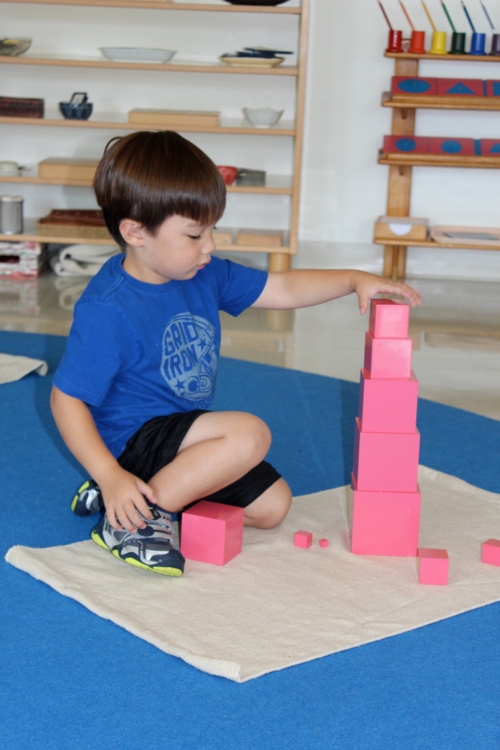
Have you ever had the chance to do something amazing, but were too afraid of failing to try? Imagine if, from the age of 2 or 3 years old, you were taught it’s not only ok to make mistakes, but encouraged because it often leads to exciting independent discoveries. This could completely reshape the way you see and experience the world.
I’ve been a Montessori teacher for almost 5 years and one of the things I love most about this method are the underlying benefits that are so ingrained in the curriculum you may miss them. It is undoubtedly exciting to see a 4 year old completing Addition work, or to hear a 3 year old reading her first words, but what really makes a Montessori education special is how the freedom, the materials, and the guides allow the child to make mistakes.
When you embark on a career as a Montessori guide and take the certification training, one of the most shocking and difficult things to put into practice at first is allowing the child to explore the materials and sometimes be unsuccessful with them! Montessori lessons are scientifically designed to be self-correcting. This means when a child is completing the Spindle Game and puts an incorrect number of spindles in a numeral box you do not step in and say, “no, that’s not right… let me show you.” Instead you let the child complete the lesson, and practice it again another day until he gets it. And amazingly, he does get it, almost every time on his own. Usually the child will come to the natural conclusion he has run out of spindles at the end, realize he made a mistake somewhere and will go back and fix it. You may have to present the lesson another time on another day; as you observe the child faltering, you will notice how proud he is when he corrects himself without you telling him. Whereas if you step in and correct him, he may get discouraged and choose to forgo the lesson entirely. Instead of you being an all-knowing, righteous higher being, you gift the child with the power of exploring for himself. The concept is clearer to him and more meaningful because he came to the conclusion independently by being the little scientific explorer the child so naturally is.

We recently had a group of children move up to Primary from a Pre-Primary room. They are just beginning to be shown new lessons. I presented the quintessential Montessori lesson, the Pink Tower, to a little boy we’ll call Peter. The Pink Tower is a Sensorial lesson with 10 pink cubes that get progressively larger with each one. I presented the lesson slowly, bringing one piece at a time to the rug and placing it gently down to encourage care of the material and graceful, refined movements. After I had brought all the pieces to the rug and laid them out in random order, I built the tower from largest to smallest. We took some time walking around the rug to marvel at our creation and then I disassembled the tower one piece at a time, brought it back to the shelf, and invited Peter to have a turn.
At first, Peter recapitulated my movements precisely. He brought each cube one at a time to the rug and carefully placed it down. When it came time to build the tower, an interesting thing happened. He was able to build the first few in order, largest to smallest, but before he would choose which one he thought was the next largest, he’d look to me every time and ask “is it this one?” And I would say “try it and let’s see…” And he would place it on top of the previous cube. If it seemed like a perfect fit, his face would light up and he’d say “it fits!” And sometimes he would choose one just a bit too small and I wouldn’t say anything. I didn’t need to… because he would place it on, realize it was a bit too small, place it back down and retrieve the correct cube. We continued on in this way and I continued to let Peter make his mistakes, because I knew he would correct himself. When he completed his tower, it looked exactly like mine had, in perfect order and we took a trip around the rug as Peter beamed down at his creation he did “all by himself.”
As I was working with Peter and he continued looking back at me to double check before selecting a cube to see if I would give him the answer, I wondered to myself if we are all born unsure of our intuition. Observing young children, you begin to realize, we are each born a blank slate and our experiences, especially early on in life, shape how much faith we have in ourselves and where we look for answers later on.
The fact that Montessori education and materials are self-correcting, and we as guides are taught to empower the child to make mistakes and later correct himself, leads to young people who hopefully grow into adults that are not constantly looking for guidance or approval outside of themselves. These foundational experiences will teach them that making mistakes is proof that you are trying, and is sometimes the best, most powerful way to learn. They will become confident, strong people who don’t back down when a challenge is presented, because they trust their intuition and know they have the answers and resilience within themselves. I believe this is one of the most powerful gifts we as Montessori teachers can give our children – the power to enter the world fearless and believe in themselves.

